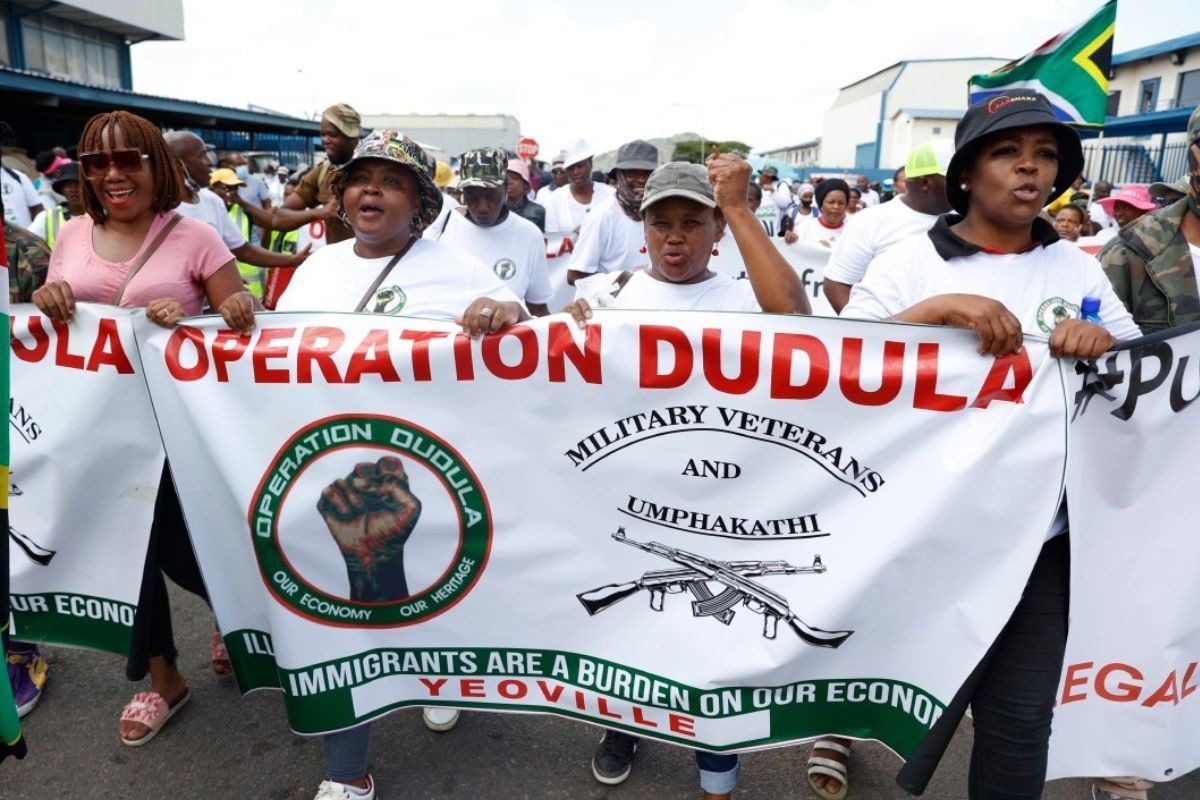On 4 November, Judge Leicester Adams of the Johannesburg High Court handed down judgment forbidding Operation Dudula and its leaders from intimidating, harassing, and/or assaulting any individuals that they identify as being non-citizens, and from making public statements on social media platforms that constitute hate speech.
Kaajal Ramjathan-Keogh, ICJ Africa Director said, “This judgment marks a major victory in the fight against xenophobia reaffirming that intimidation, harassment, and hate speech on the grounds of nationality, social origin, or ethnicity will not be tolerated in South Africa at public gatherings, on social media, or anywhere else. We hope that the court order will be respected by Operation Dudula and others”.
The decision is the culmination of a legal battle to put an end to the unlawful conduct of Operation Dudula and its members. Operation Dudula is voluntary association registered as a non-profit company, with the stated objective of “expelling foreign nationals from South Africa”.
As regards actual harm, the judgment confirms that the undisputed evidence revealed a clear pattern of unlawful acts perpetrated by Operation Dudula, its public representatives and its members. Operation Dudula has engaged in the incitement of violence, the propagation of hate speech and other unlawful conduct both at gatherings and on its social media platforms. Such conduct is in clear contravention of section 8(6) of the Regulation of Gatherings Act 205 of 1993 (Gatherings Act) and of section 10 of the Promotion of Equality and Prevention of Unfair Discrimination Act 4 of 2000 (Equality Act), which prohibits speech that incites harm on grounds that include nationality, social origin, race and ethnicity. The judgment also underscores that social media cannot be a shield for hate speech or vigilantism, affirming that all persons in South Africa, regardless of nationality, are entitled to dignity, equality, and protection under the Constitution.
Among other things, Judge Adams’s judgment orders that:
(1) …only an immigration officer or a police officer has the power in terms of section 41 of the Immigration Act 13 of 2002 to demand that another private person produce her / his passport or other identity documents to demonstrate her / his right to be in the Republic of South Africa and that no private person has the power to do so unless expressly so authorised by law.
(2) The first respondent [Operation Dudula], the eleventh [Zandile Dabula, Operation Dudula leader] and twelfth [Dan Radebe, Operation Dudula Deputy Chairperson] respondents be and are hereby interdicted and restrained from demanding that any private person produce her / his passport or other identity documents to demonstrate her / his right to be in the Republic.
Kopanang Africa Against Xenophobia (KAAX), represented by the Socio-Economic Rights Institute of South Africa, brought the case to court. SECTION27 and the International Commission of Jurists (ICJ), represented by Webber Wentzel, along with the United Nations Special Rapporteur on Human Rights Defenders, represented by Lawyers for Human Rights, and Media Monitoring Africa, represented by Power Law Africa, intervened as amici curiae.
The application was brought in two parts: A and B. Judge Adams’s judgment relates to part B. Part B sought interdictory and declaratory relief against the conduct of Operation Dudula. A decision on Part A is pending.
The ICJ’s submission focused on South Africa’s binding international legal obligations and the Constitutional requirement to protect non-citizens from discrimination, violence, and other abuse, particularly in the context of immigration enforcement. ICJ also raised concerns about the State’s failure to fully implement the National Action Plan to Combat Racism, Racial Discrimination, Xenophobia and Related Intolerance, citing in particular the observations of the UN Committee on the Elimination of Racial Discrimination, which called on South Africa to finalize its data systems, assess the plans impact, and ensure interdepartmental accountability. The court referenced this in the judgment. The ICJ’s submission relied in part on the 8 March Principles for a human rights-based approach to criminal laws proscribing conduct associated with sex, reproduction, drug use, HIV, homelessness and poverty.
The Applicant KAAX’s claim that the police and Department of Home Affairs support or collude with Operation Dudula was not accepted and the court held that the applicants failed to present credible evidence to support that claim.
The ICJ was represented by Advocates Irene Mpofu and Thabang Pooe. Webber Wentzel Attorneys represented the ICJ on a pro bono basis.
Read the full judgment here: https://www.saflii.org/za/cases/ZAGPJHC/2025/1102.html
Contact
Kaajal Ramjathan-Keogh, Africa Director Kaajal.Keogh@icj.org





